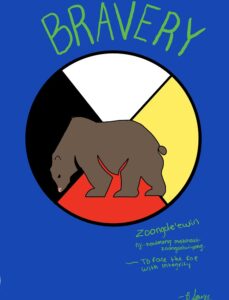Biidaaban Community Service-Learning revitalizes reconciliation

By Kelly Anne Smith
NORTH BAY— A North Bay professor says efforts are needed to continue Reconciliation. That’s why he is calling the Biidaaban Community Service-Learning summer program at Nipissing University a success, even during the coronavirus disease 2019 (COVID-19) pandemic.
Dr. Jonathan Pitt teaches in Biidaaban Community Service-Learning (BCSL), which is delivered through Enji giigdoyang – Office of Indigenous Initiatives at Nipissing University in a partnership with Lakehead and Algoma Universities.
“It’s really a collaborative effort. Nipissing University has a long history of supporting Indigenous learners and Indigenous education.”
Dr. Pitt is of mixed First Nations ancestry and of the Bear Clan with many of his relatives coming from off-reserve communities in Pontiac County.
The professor says it’s the first time he has seen such a program delivered.
“This is an Indigenous success story, as we have recently completed a BCSL project in support of reconciliation through traditional teachings, done remotely and during the pandemic. I think it is something to be celebrated,” he says. “This was solely done in a remote manner with students from many First Nations, traditional territories, some on reserve, and some are off depending on the Indigenous community.”
Pitt video conferenced with the students every day. There were student mentors and access to cultural supports as well. Two courses were completed.
“One was a lands-based course. The other being critical learning skills within an Indigenous context, which looks at historical and contemporary Indigenous issues,” Pitt explains. “We come at it with an Indigenous worldview. We do unpack Western worldviews and Indigenous worldviews. Looking at contemporary issues rooted in historical timelines.”
What is Truth and Reconciliation? Students discussed this important question which led to the collaborative project created as a resource for educators, A Reconciliation Revitalization Teacher Resource Through the Traditional Values of The Seven Grandfather Teachings.
“With Indigenous courses and Indigenous knowledge frameworks – it’s cultural transmission. You are looking at things like Traditional Ecological Knowledge, or what some people refer to as TEK,” says Pitt. “You are looking at Indigenous ways of knowing. That in itself is cultural transmission. Looking at those concepts and then relating it to a transformative educational model. I believe this benefits Indigenous learners and helps to get them set-up for success.”
The role of education within Indigenous culture is explored in both an historical and contemporary context, says Pitt.
“Reconciliation being one of the topics that we cover within the course, we looked at it based on the 2015 – 94 Calls to Action.”
He asks, “What’s a way that we can help to revitalize reconciliation? That’s the reality on the ground. Reconciliation needs a revitalization.”
“We looked at it through traditional teachings and traditional laws with a historical timeline. As some Indigenous scholars would say, ‘It’s been seven generations since the Indian Act was first imposed on First Nations.’ We came up with the concept, it will likely take at least seven more to repair the damage that’s been done because reconciliation isn’t a one-off or a destination. It’s more of a behavioural pattern for a way forward.”
Pitt says the truth part is often overlooked when looking at Truth and Reconciliation.
“In order for reconciliation to occur, the truth has to first be addressed. If you look at the last two Stat Can reports, the Indigenous demographic continues to grow. With more Indigenous people in university, that will translate into a transformative shift and that will go into grad studies. When that happens, you will see more Indigenous scholars in the academy and administration. That will create more change at the post-secondary level.”
Pitt says that within this project, they are walking the talk, by answering the TRC Calls to Action on education.
“I think that it’s a really great example of students and instructors coming together to share – speak the truth and move that needle on reconciliation.”
Student Brooklyn Sawyer-Gingras of Nipissing First Nation discusses her submitted art in the publication, in which a bear and a Medicine Wheel represent Bravery in the Seven Grandfather Teachings.
“While creating this image, it was almost a teaching for me to learn— to learn how to stand up for myself and my community. I have always been shy, but recently, since my dad passed in June 2020, I have been looking up to his bravery when he was here in the physical world and it inspires me to truly be who I am. I am thankful I was given the teaching of Bravery as it added a new teaching to my bundle.”

